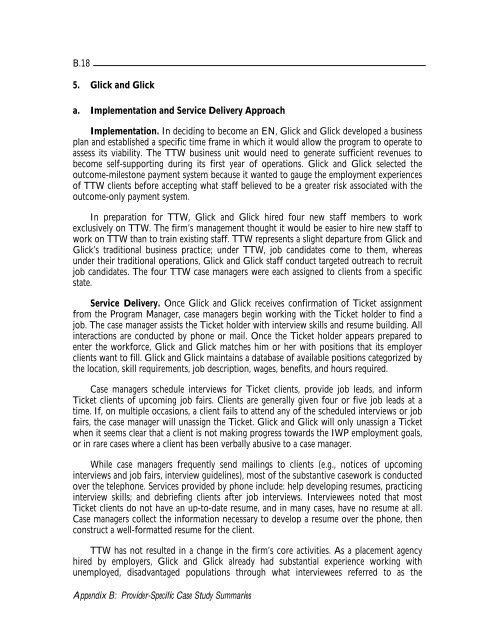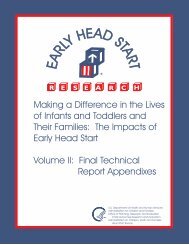Evaluation of the Ticket to Work Program Initial Evaluation Report
Evaluation of the Ticket to Work Program Initial Evaluation Report
Evaluation of the Ticket to Work Program Initial Evaluation Report
Create successful ePaper yourself
Turn your PDF publications into a flip-book with our unique Google optimized e-Paper software.
B.18<br />
5. Glick and Glick<br />
a. Implementation and Service Delivery Approach<br />
Implementation. In deciding <strong>to</strong> become an EN, Glick and Glick developed a business<br />
plan and established a specific time frame in which it would allow <strong>the</strong> program <strong>to</strong> operate <strong>to</strong><br />
assess its viability. The TTW business unit would need <strong>to</strong> generate sufficient revenues <strong>to</strong><br />
become self-supporting during its first year <strong>of</strong> operations. Glick and Glick selected <strong>the</strong><br />
outcome-miles<strong>to</strong>ne payment system because it wanted <strong>to</strong> gauge <strong>the</strong> employment experiences<br />
<strong>of</strong> TTW clients before accepting what staff believed <strong>to</strong> be a greater risk associated with <strong>the</strong><br />
outcome-only payment system.<br />
In preparation for TTW, Glick and Glick hired four new staff members <strong>to</strong> work<br />
exclusively on TTW. The firm’s management thought it would be easier <strong>to</strong> hire new staff <strong>to</strong><br />
work on TTW than <strong>to</strong> train existing staff. TTW represents a slight departure from Glick and<br />
Glick’s traditional business practice; under TTW, job candidates come <strong>to</strong> <strong>the</strong>m, whereas<br />
under <strong>the</strong>ir traditional operations, Glick and Glick staff conduct targeted outreach <strong>to</strong> recruit<br />
job candidates. The four TTW case managers were each assigned <strong>to</strong> clients from a specific<br />
state.<br />
Service Delivery. Once Glick and Glick receives confirmation <strong>of</strong> <strong>Ticket</strong> assignment<br />
from <strong>the</strong> <strong>Program</strong> Manager, case managers begin working with <strong>the</strong> <strong>Ticket</strong> holder <strong>to</strong> find a<br />
job. The case manager assists <strong>the</strong> <strong>Ticket</strong> holder with interview skills and resume building. All<br />
interactions are conducted by phone or mail. Once <strong>the</strong> <strong>Ticket</strong> holder appears prepared <strong>to</strong><br />
enter <strong>the</strong> workforce, Glick and Glick matches him or her with positions that its employer<br />
clients want <strong>to</strong> fill. Glick and Glick maintains a database <strong>of</strong> available positions categorized by<br />
<strong>the</strong> location, skill requirements, job description, wages, benefits, and hours required.<br />
Case managers schedule interviews for <strong>Ticket</strong> clients, provide job leads, and inform<br />
<strong>Ticket</strong> clients <strong>of</strong> upcoming job fairs. Clients are generally given four or five job leads at a<br />
time. If, on multiple occasions, a client fails <strong>to</strong> attend any <strong>of</strong> <strong>the</strong> scheduled interviews or job<br />
fairs, <strong>the</strong> case manager will unassign <strong>the</strong> <strong>Ticket</strong>. Glick and Glick will only unassign a <strong>Ticket</strong><br />
when it seems clear that a client is not making progress <strong>to</strong>wards <strong>the</strong> IWP employment goals,<br />
or in rare cases where a client has been verbally abusive <strong>to</strong> a case manager.<br />
While case managers frequently send mailings <strong>to</strong> clients (e.g., notices <strong>of</strong> upcoming<br />
interviews and job fairs, interview guidelines), most <strong>of</strong> <strong>the</strong> substantive casework is conducted<br />
over <strong>the</strong> telephone. Services provided by phone include: help developing resumes, practicing<br />
interview skills; and debriefing clients after job interviews. Interviewees noted that most<br />
<strong>Ticket</strong> clients do not have an up-<strong>to</strong>-date resume, and in many cases, have no resume at all.<br />
Case managers collect <strong>the</strong> information necessary <strong>to</strong> develop a resume over <strong>the</strong> phone, <strong>the</strong>n<br />
construct a well-formatted resume for <strong>the</strong> client.<br />
TTW has not resulted in a change in <strong>the</strong> firm’s core activities. As a placement agency<br />
hired by employers, Glick and Glick already had substantial experience working with<br />
unemployed, disadvantaged populations through what interviewees referred <strong>to</strong> as <strong>the</strong><br />
Appendix B: Provider-Specific Case Study Summaries
















